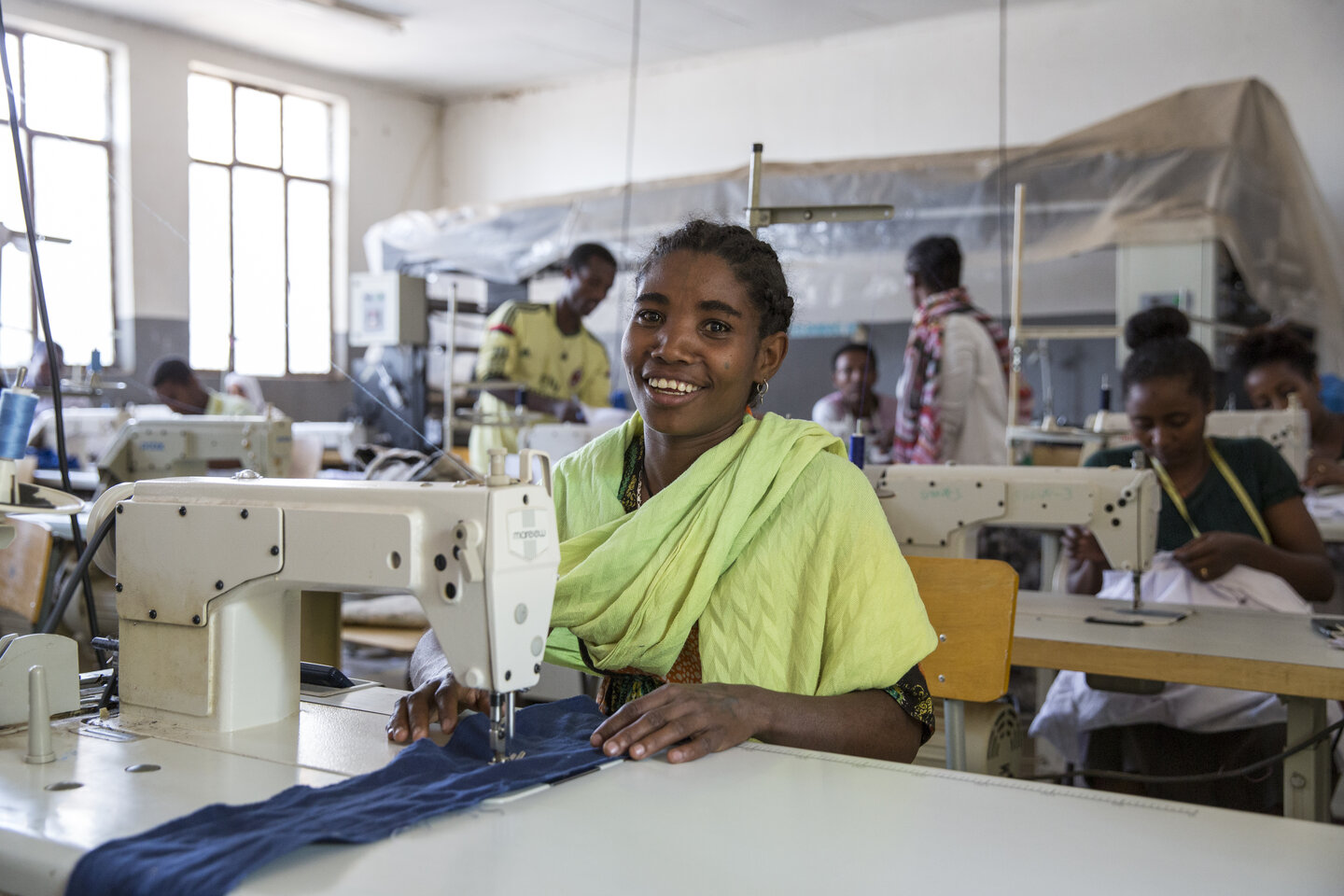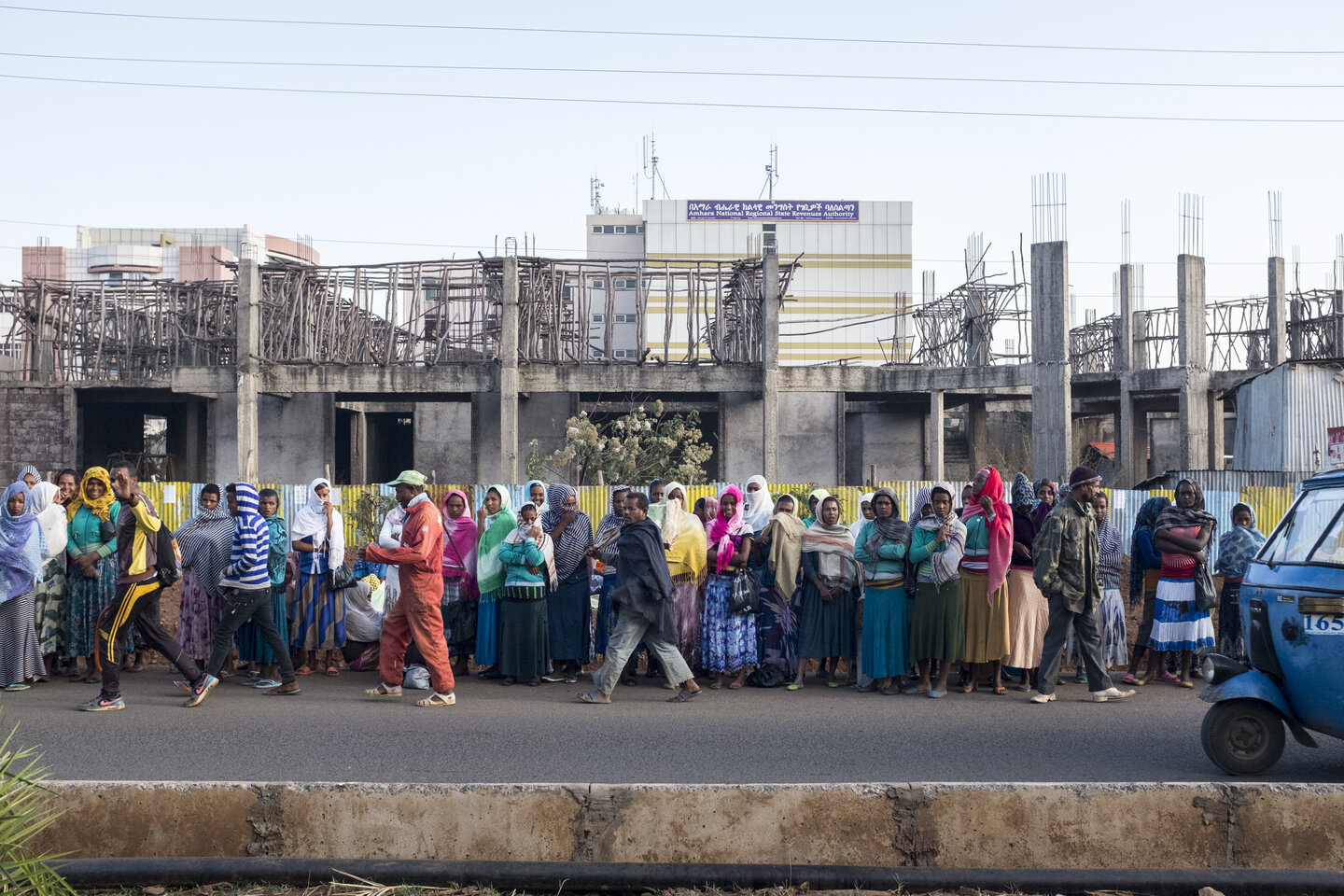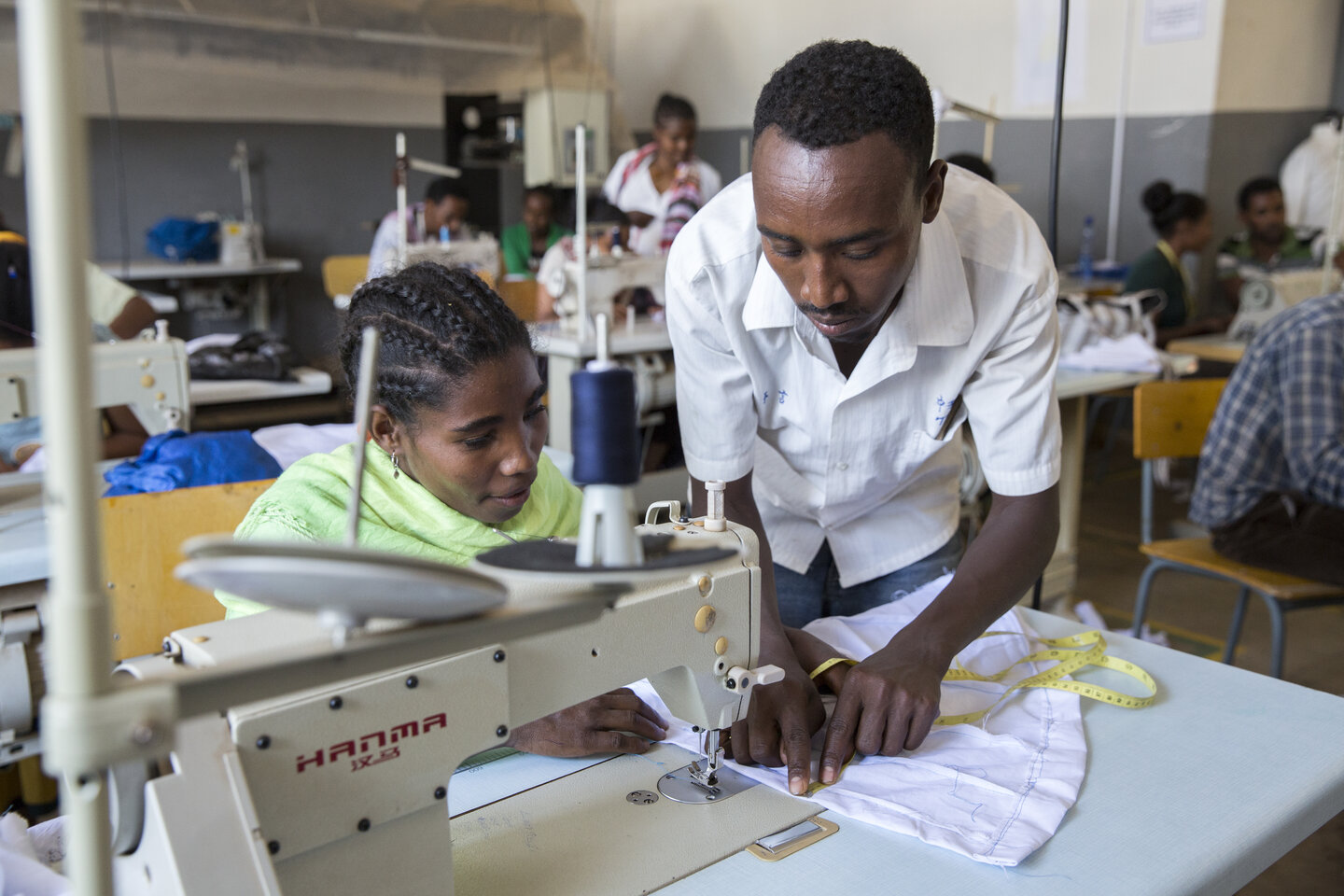Yezina Zeru won’t let anything, and certainly not her disability, get in the way of her plans. This young Ethiopian plans to be a successful tailor and live her life as she sees fit.

To understand Yezina’s story, we have to go to Tanqua. A two-hour bus ride north from Bahir Dar, then a walk across country on rock-hard ground and parched streambeds. The trek only takes Yezina an hour. Because, despite her limp, this small woman walks the way she lives her whole life: swiftly, undeterred, persevering.
Upon reaching the village, Yezina learns that her widowed mother has been called away to a funeral. The simple house in which Yezina grew up, made of branches, boards and loam, is empty today, except for a lone calf standing in the kitchen with its open hearth.
Sisters from different worlds
If Yezina is disappointed, she doesn’t let on. But she’s all the more affectionate when her sister Mitikie gets back: four kisses, laughter. They sit down on the bed in their mother’s house. There are some clay vessels in the dark room; household utensils and tools for working in the fields are strapped under the corrugated metal roof.
Yezina and Mitikie used to sleep here. They are still close, even though they live in different worlds. Mitikie stayed in the village, never went to school. Now she’s 35 and has five children, working in the fields and in the home is her daily life. Yezina seems metropolitan in comparison, with her clothes, her carefully braided hair, and especially when she uses her mobile phone to arrange for a sitter to look after her daughter at home. She is still attached to her village and the people here. But you can tell she’s proud to return as the woman she is now: a woman standing on her own two feet with a family, a job, a future.
That this energetic young woman should be running her own little tailor shop in the city of Bahir Dar is hardly a matter of course. The future didn’t look rosy when Yezina was born 27 years ago, the next-to-last of nine siblings. As a small child she came down with a serious illness, probably polio, her leg was deformed. She has had great difficulty walking ever since. And yet it was her handicap, of all things, that was to prove her lucky break. "Since working in the fields was out of the question," she recounts, "I was the only one in the family my father sent to school." None of her siblings can read or write.

Although the way to school became longer and harder from fourth grade on, and later on she even had to earn money herself to pay for lodgings near school, Yezina persevered. But after 10th grade it was over: the family couldn’t afford vocational training for her. So Yezina shared the fate of many in Bahir Dar who scrape by as day labourers, autorickshaw drivers or unskilled domestic or manual workers.
Bahir Dar, the capital of the Amhara region, with a population of over half a million in the metropolitan area, is known for the monasteries on the islands on Lake Tana and the Blue Nile waterfalls. But lately Bahir Dar has been seeing an enormous influx of young people from the countryside, making it one of the fastest-growing cities in Ethiopia. What that means can be seen every morning at the major intersections in the city: hundreds of people waiting by the roadside in the hope that a lorry will stop and take them to one of the building sites. Most of them wait in vain.
Qualification in three months
Yezina doesn’t need to do odd jobs anymore to stay afloat – thanks to the vocational training programme Helvetas launched in 2015. Yezina saw posters advertising the programme and inquired at city hall: they were offering a three-month course of vocational training for young people from destitute families. And especially for disadvantaged people like her: women with disabilities, single mothers and AIDS orphans.

Yezina attended one of the first courses and passed the state-accredited exam after three months. And she wasn’t the only one: of the roughly one thousand people – almost four-fifths of whom were women – who underwent this training in 2015/16, 90 per cent passed the exam and 76 per cent either found a steady job shortly after completing the course or succeeded in starting up their own business. One reason for these impressive results is the success-based remuneration of the training centres: The training centres are not paid in full unless and until the trainees earn a steady income.
So far, training has been offered in ten occupations, including cabinet making, catering and hotel business, auto mechanics, hairdressing – and tailoring.
Chalachew Gebeyehu, Helvetas project manager
Customer service included
Yezina went into business about a year ago. The part of town she lives and works in is not affluent, but lively. Women roast grain by the roadside in front of their houses, others sit outside on low benches.
Yezina’s shop is on a hard-packed dirt road lined with small, simple houses of corrugated metal and boards. There’s a clothesline running right across the road, no motor traffic is to be expected around here. "The people don’t have much money," says Yezina. And that’s precisely why she felt a tailor shop was just the right thing. "People always need clothes – and if they don’t have much money, they get their old clothes mended." Yezina talks about how the new business is doing – and what she does to attract and hold on to customers.
Yezina has her very own marketing strategy. Those who come round only once to have a garment mended pay more than regulars. The system works the other way round for orders to make new clothes: The first time customers order new clothes, they get an introductory discount.
But there are limits to this get-acquainted pricing: elaborate embroidery is not to be had for under 600 birr, that’s about 25 euros. She explains affably but firmly to Anchinalu Getinet, her neighbour, how much hard work is involved. But the price is still too high for Anchinalu. She wants Yezina to sew and embroider a traditional Ethiopian robe for her, the kind women wear to festivals and to church here. The negotiations prove longwinded. In the end they settle on a simpler pattern for 500 birr. Yezina has secured an order – and a new customer’s confidence.
A smile for customers
Every morning Yezina takes out her sewing machine and places it out on the road in front of her little hut, for lack of space, but also so everyone can see: I’m sewing for you! It goes without saying that she often wears her own designs. How does she attract business and hold on to it? "Good service," replies Yezina.
Yezina, businesswoman
Whatever’s left over at the end of the month she saves, and she’d like to apply to the women’s fund for an interest-free loan to buy a better sewing machine. Besides vocational skills, all the courses in the Helvetas programme include a module in business management so trainees learn the essentials of marketing, accounting and customer service, as well as the safest way to save money and how to draw up a business plan. They are also told that with their state-recognized qualification, they can apply to the city for an interest-free business development loan or for subsidized commercial premises to use for their own business undertaking.
These young men and women need a lot more than marketable skills. They need future prospects in order to make their own way in the world. That goes especially for women.
Vocational training often saves them from being married off at an early age. Earning an income of their own gives them a certain standing within the family and a say in their own affairs. That’s how it was for Yezina, too, although initially the other way round.
Yezina Zeru, tailor, wife and mother
But she was undeterred. "I knew Tadele was the right one for me," Yezina says about the man who is now her husband. Tadele Desta has a handicap too: his hand is paralysed and he has difficulty speaking. Nevertheless, he mends clothes too. With the back of his hand he manages to push the fabric under the presser foot of the sewing machine. The first time Yezina saw him he was working at a sewing machine. She liked his looks. Yezina and Tadele, with his infectious laugh, are now a good team, they make all their decisions together. And they’re the proud parents of two-year-old Yabsira. All their efforts are for their daughter’s future. Above all, the one thing her mother wants to give her later on is: "Education, as much as at all possible."
Keralem: the hope of the family
In Ethiopia every name has a meaning. One name means “victor,” another “leader” or “gift from God”. “Keralem”, however, means “unfinished world”. The name doesn’t fit this cheerful 19-year-old girl at all, who began training in cabinet-making a month ago. "My husband died shortly after Keralem was born," explains her mother, Worke Genetu. From one day to the next, Worke was left with nothing, except five small children to raise all alone. Her world lay in ruins. The future looked bleak. "I had to provide for the family all by myself." Keralem recalls the time before her training.
Only those who call on Keralem’s family at home will see how poor they are today. On the outskirts of the city, beyond the city streets, beaten paths lead through the undergrowth. In a mud-walled house the family built themselves, the mother and her four grown-up daughters share a room.
Keralem’s siblings are unemployed, only one of them earns a meagre wage as a cleaning lady. So the mother has pinned her hopes on Keralem: «I’m growing old now,» she says. "I hope to God Keralem will be able to support not only me, but also her sisters, thanks to her training." Only she also hopes her youngest daughter will never marry.
Worke Genetu, Keralem's mother
Keralem lets us in on her own plans in the carpenter’s workshop at the vocational school in Bahir Dar, where she is putting together her very first chest of drawers. Keralem is convinced she’ll achieve her goal of having her own cabinet-making shop.
Keralem, in training as a carpenter
After completing her training, she plans to look for a job first, gain some experience and save some money. Their youthful optimism is quite justified. There is huge demand for skilled workers in the cabinet-making trade, says her instructor Yichalal Mulualem. He finds the intensive training convincing because it is focussed and efficient – and because the trainees are motivated. "These young people come with a clear-cut goal, they know exactly what they want to achieve. They’re highly motivated, which motivates me, too."
Yichalal Mulualem, vocational school instructor
































